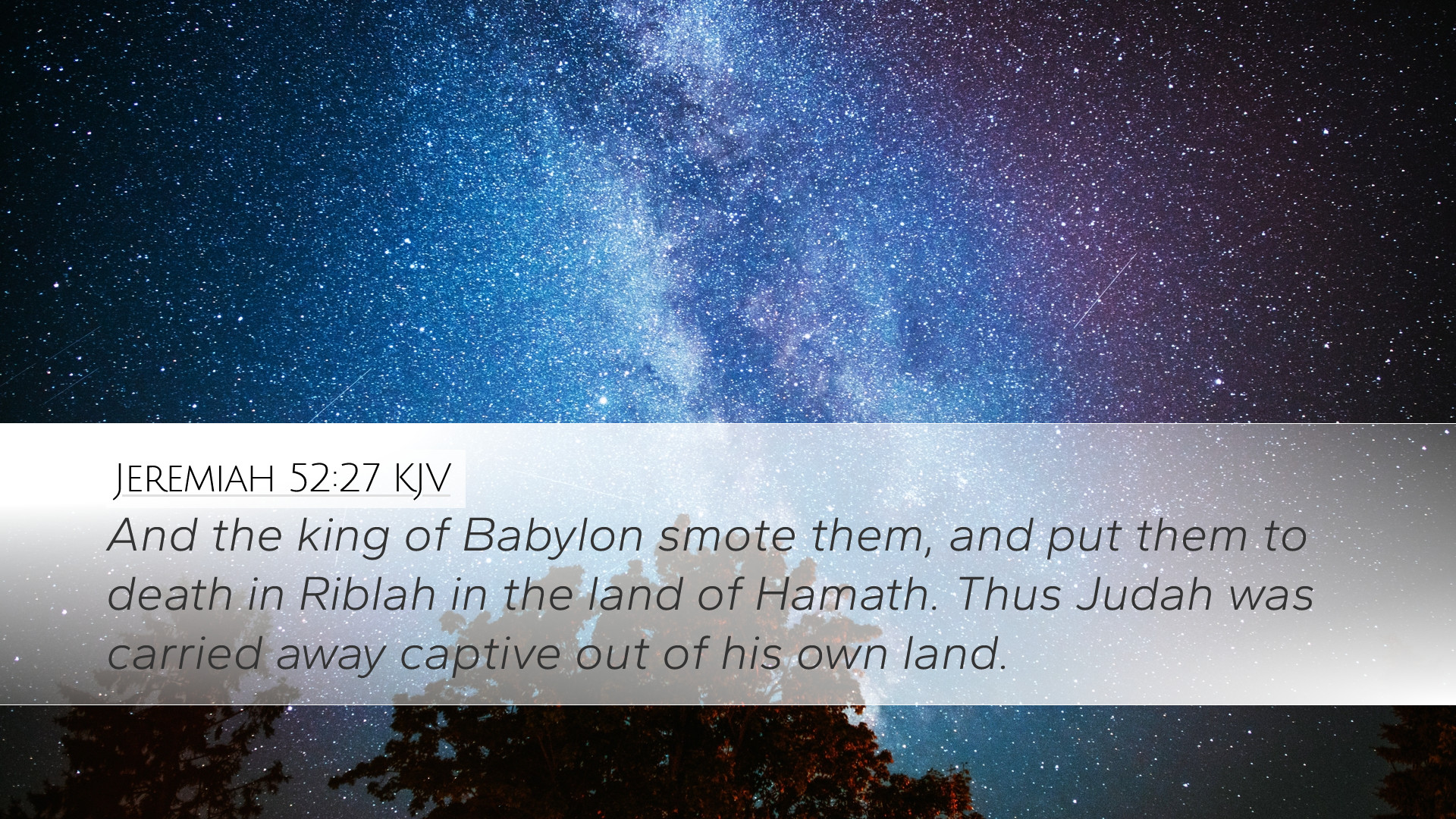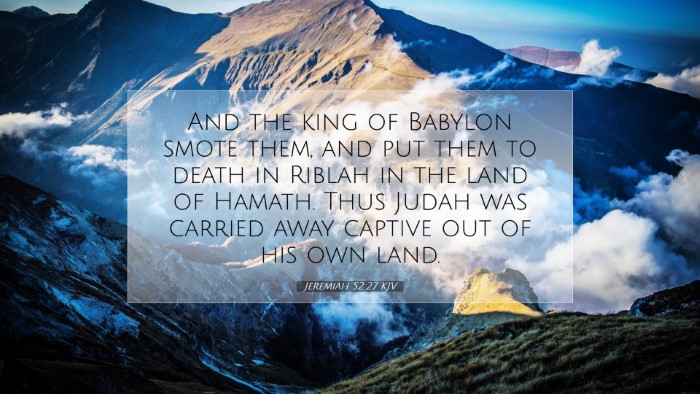Commentary on Jeremiah 52:27
Verse Context: Jeremiah 52:27 states, "And the king of Babylon slew the sons of Zedekiah before his eyes: he slew also all the princes of Judah in Riblah." This verse captures a poignant moment in history, marking the tragic end of Zedekiah's reign and the downfall of Judah.
Historical Background
To understand the depth of Jeremiah 52:27, it is essential to consider the historical context. King Zedekiah, the last king of Judah, is depicted as a figure who was both a victim and an agent of prophecy. His reign was characterized by political turmoil and spiritual decline. After the siege of Jerusalem by the Babylonians, Zedekiah fled but was captured, leading to the horrific events described in this verse.
- Fall of Jerusalem: The circumstances surrounding the fall of Jerusalem are critical for understanding the weight of this verse. The city fell after a prolonged siege, during which Zedekiah attempted to seek help from surrounding nations yet ultimately relies on the very gods his people had forsaken.
- Babylonian Conquest: Nebuchadnezzar’s army symbolizes the Divine judgment upon Judah for their unfaithfulness and rebellion as foretold consistently in the prophetic writings.
Commentary Insights
Matthew Henry's Perspective
Matthew Henry emphasizes the stark reality of divine justice at play in this moment. He comments on the severity of the punishment meted out by the Babylonians as representative of God's displeasure with Israel’s apostasy. Henry notes that the sight of Zedekiah witnessing the execution of his sons was a direct fulfillment of Jeremiah's earlier prophecies, underscoring God’s sovereignty even in calamity.
Albert Barnes' Contributions
Albert Barnes suggests that this brutal scene illustrates the ultimate fate of those who steadfastly reject God. Zedekiah’s failure to heed the warnings of Jeremiah and to lead his people into repentance results in this moment of personal and national tragedy. Barnes articulates the theological implications of such events, highlighting how they serve to remind contemporary believers of the consequences of disobedience to divine commands.
Adam Clarke's Analysis
Adam Clarke's commentary further expounds on the emotional weight of the verse, focusing on the psychological impact of witnessing his sons' death. Clarke poignantly remarks that Zedekiah’s suffering was not just physical but deeply spiritual—he faced the sorrow of a father and the recognition of his failed leadership. Clarke interprets this as a call to consider the broader consequences of our actions and failures in leadership.
Theological Reflections
Jeremiah 52:27 presents profound theological implications that resonate with pastors, scholars, and students alike:
- Divine Sovereignty: The verse reinforces the belief in God's sovereign control over nations and history, reminding believers that God's purposes prevail even in dire circumstances.
- Judgment and Mercy: While it highlights divine judgment, it also prompts reflection on God's mercy. The narrative implies that the opportunity for repentance was available, though ignored.
- Human Leadership: Zedekiah’s end serves as a cautionary tale regarding the responsibility of leaders to guide their people according to divine principles, illuminating the weight of their influence and decision-making.
Practical Applications
This verse, while historical, carries timeless lessons for the church today:
- Call to Repentance: It urges the community of faith to address sin earnestly and to corporately seek God’s face for restoration.
- Endurance in Trials: For individuals facing personal trials, Jeremiah 52:27 serves as a reminder of God’s presence, even when circumstances are dire.
- Leadership Accountability: Church leaders should recognize the importance of leading with integrity and faithfulness, aware that their actions bear significant consequences.
Conclusion
Jeremiah 52:27 encapsulates a moment of profound loss and divine judgment, yet within it lies a call to reflection for contemporary believers. Through the insights of Matthew Henry, Albert Barnes, and Adam Clarke, we see a multi-faceted understanding of this pivotal verse. As pastors, theologians, and students delve into these insights, they are invited to engage with the text not merely as an account of history but as a living document that speaks to the heart of God’s covenant with His people, emphasizing the profound consequences of leadership, the need for repentance, and the continuous call of God’s mercy amid judgment.


